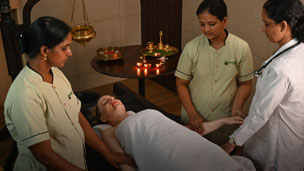







For authentic & scientific
ayurveda
Nagarjuna has developed speciality protocols
and adopted integrated and holistic approaches “to improve
the quality of life of ailing population”.
Knee Arthritis
Knee arthritis refers to the inflammation or pain experienced in the knee joints, which can significantly impact one's ability to perform everyday activities. While arthritis can affect any joint in the body, it is particularly prevalent in the knee joint.
The knee joint is a complex hinge joint that connects the thigh bone (femur) to the shinbone (tibia). It is supported by ligaments, tendons, cartilage, and synovial fluid, which facilitate smooth movement and provide stability. However, with knee arthritis, the joint undergoes degenerative changes that result in pain, stiffness, and reduced mobility.
There are several types of knee arthritis, but the most common ones are osteoarthritis and rheumatoid arthritis. Osteoarthritis, also known as degenerative joint disease, typically occurs with age or as a result of wear and tear on the joint. The protective cartilage that covers the ends of the bones gradually wears away, leading to friction, inflammation, and pain. Rheumatoid arthritis, on the other hand, is an autoimmune disease in which the body's immune system mistakenly attacks the synovial lining of the joint, causing inflammation, pain, and potential joint damage.
The symptoms of knee arthritis can vary from person to person but often include pain, swelling, stiffness, tenderness, and a decreased range of motion in the affected knee. These symptoms can make everyday activities challenging, such as walking, climbing stairs, getting up from a seated position, or even standing for extended periods. Knee arthritis can have a significant impact on a person's quality of life, leading to reduced mobility, limitations in performing work-related tasks, and overall disability.
Treatment for knee arthritis aims to manage pain, reduce inflammation, and improve joint function. Non-surgical approaches may include lifestyle modifications, such as weight management, regular exercise, and physical therapy, which help strengthen the surrounding muscles and provide support to the joint. Medications like nonsteroidal anti-inflammatory drugs (NSAIDs), corticosteroids, and analgesics can provide relief from pain and inflammation. In some cases, assistive devices like braces, canes, or orthotics may be recommended to alleviate stress on the knee joint.
In more severe cases, when conservative treatments fail to provide adequate relief, surgical interventions may be considered. These can range from minimally invasive procedures like arthroscopy, which involves removing debris or repairing damaged structures within the knee, to partial or total knee replacement surgery, where the damaged joint surfaces are replaced with artificial implants.
In conclusion, knee arthritis is characterized by inflammation and pain in the knee joints, making it challenging to perform everyday activities. It is a common condition that can cause significant disability and lost work time for many individuals. Understanding the type of arthritis, managing symptoms, and seeking appropriate medical interventions can help alleviate pain, improve joint function, and enhance the overall quality of life for those affected by knee arthritis.
Please fill up the form to get in touch with us, or contact us for any queries





Terms of use | Privacy Policy | Contact us
Copyright © 2026. All Rights Reserved
Designed & Developed by Websoul Techserve








